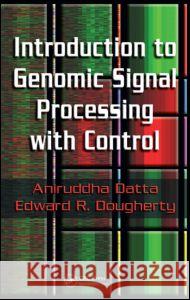Introduction to Genomic Signal Processing with Control » książka
Introduction to Genomic Signal Processing with Control
ISBN-13: 9780849371981 / Angielski / Twarda / 2006 / 288 str.
Studying large sets of genes and their collective function requires tools that can easily handle huge amounts of information. Recent research indicates that engineering approaches for prediction, signal processing, and control are well suited for studying multivariate interactions. A tutorial guide to the current engineering research in genomics, Introduction to Genomic Signal Processing with Control provides a state-of-the-art account of the use of control theory to obtain intervention strategies for gene regulatory networks.
The book builds up the necessary molecular biology background with a basic review of organic chemistry and an introduction of DNA, RNA, and proteins, followed by a description of the processes of transcription and translation and the genetic code that is used to carry out the latter. It discusses control of gene expression, introduces genetic engineering tools such as microarrays and PCR, and covers cell cycle control and tissue renewal in multi-cellular organisms.
The authors then delineate how the engineering approaches of classification and clustering are appropriate for carrying out gene-based disease classification. This leads naturally to expression prediction, which in turn leads to genetic regulatory networks. The book concludes with a discussion of control approaches that can be used to alter the behavior of such networks in the hope that this alteration will move the network from a diseased state to a disease-free state.
Written by recognized leaders in this emerging field, the book provides the exact amount of molecular biology required to understand the engineering applications. It is a self-contained resource that spans the diverse disciplines of molecular biology and electrical engineering.











